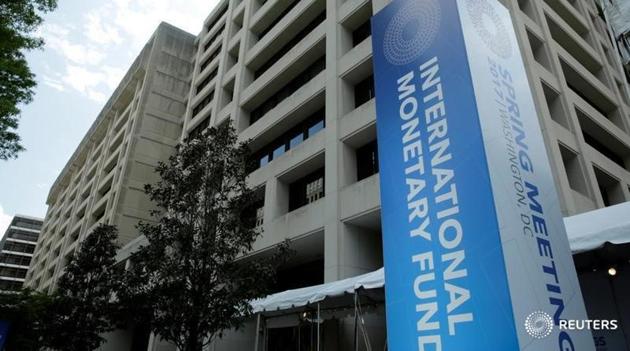
The International Monetary Fund headquarters building in Washington, U.S.(Reuters)
A report released in October by Small Arms Survey revealed that the South Sudan government used loans from the International Monetary Fund between 2020 and 2021 to reward military and political loyalists.
The report Titled: Pay Day Loans and Backroom Empires: South Sudan’s Political Economy since 2018, says $226.5 million IMF loans to the country have been characterized by a series of irregularities.
The report seen by Eye Radio says the IMF gave the government a Rapid Credit Facility loan of USD 52.3 million in emergency assistance in November 2020 and USD 174.2 million in March 2021.
It says up to 30 per cent of these disbursements have not been accounted for, and the government’s financial management has been poor.
The researcher and author of the report, Joshua Craze says both loans came with a number of conditions designed to improve financial management in the country.
He says, that, both disbursements, however, were tarnished with a number of irregularities.
In the report, the loan was used to pay pro-government forces while opposition forces composed of part of the national army were not paid in the loan.
The report says, for the first disbursement, the IMF, along with South Sudan’s auditor general, found that 31 percent of the funds effectively vanished, or in the more technocratic language of the IMF, ‘Adequate documentation could not be provided for 31 percent of the funds disbursed’.
The Small Arms Survey report also says there was a similar story with the second disbursement, which was 29 percent non-compliant with the conditions of the loan.
It says despite these irregularities, the IMF agreed to a further disbursement of USD 114.8 million under the ‘Food Shock Window’ of the RCF on 1 March 2023.
The report stated that approximately 70 percent of the initial two disbursements that were accounted for revealed a consistent set of government strategies to divert these funds.
These included making ghost payments to non-existent soldiers and prioritizing payments to the government’s own military forces while minimizing payments to SPLM/A-IO forces and officials.
For instance, in 2020, payments for salary arrears in the SSPDF overwhelmingly went to military divisions in the Bahr el Ghazal region.
It alleged that Division 11 in Warrap received SSP 20,459,090 (USD 20,000) and Division 3 in Northern Bahr el Ghazal received SSP 26,400,210 (USD 26,000).
In comparison, Division 4 in Unity State received only SSP 14,811,486 (USD 14,000).
These payments to the SSPDF occurred at a time when Division 11 was allegedly recruiting in Warrap —in contravention of the R-ARCSS—raising the real possibility that IMF loans went directly to new recruits.
The IMF’s RCF in November 2020 was designed to pay for salary arrears for government civil servants, as well as for the military.
The author says here, too, that there were irregularities designed to funnel payments to actors loyal to the government.
He says for instance, nearly a third of the almost USD 6 million allocated for salary arrears to diplomatic missions was used for other purposes.
According to the National Audit Chamber, Money from the IMF was also used to fund other security sectors.
Eye Radio emailed the IMF for comment on the allegations, but there was no response.
EDITORS’ NOTE: Eye Radio’s unsuccessful attempts to get a response from both the government and the International Monetary Fund have delayed the publication of this story.
Support Eye Radio, the first independent radio broadcaster of news, information & entertainment in South Sudan.
Make a monthly or a one off contribution.
Copyright 2024. All rights reserved. Eye Radio is a product of Eye Media Limited.